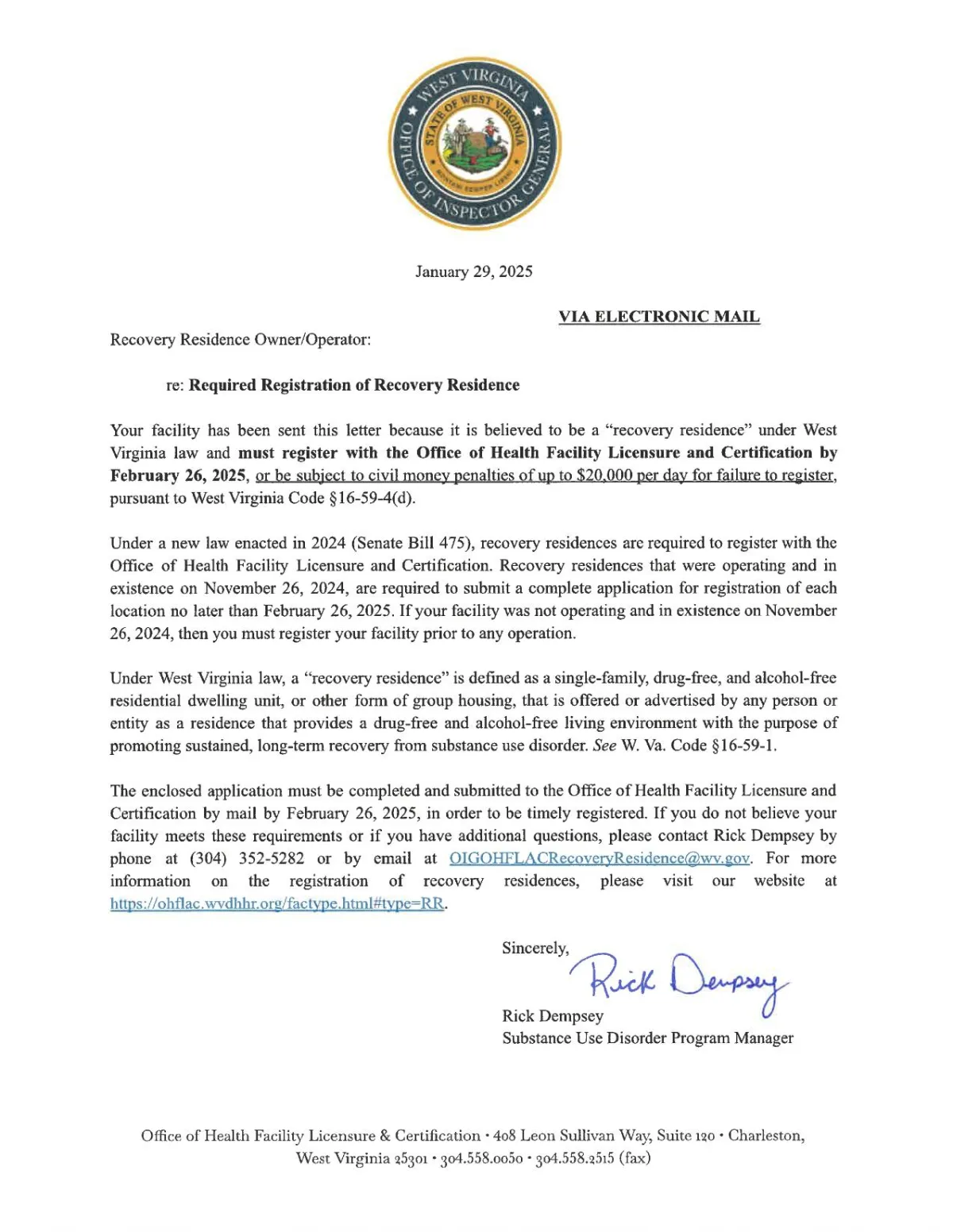CABELL COUNTY RECOVERY COALITION
The Cabell County Recovery Coalition (CCRC) is a county-based coalition committed to elevating the quality of recovery residences in Cabell County. Established in 2021, CCRC is led by a team of experts in the recovery field and works in collaboration with a broad range of partners, including local governmental officials.
WHO WE ARE and WHAT WE BELIEVE
CABELL COUNTY RECOVERY COALITION
CCRC’S work is driven by its mission, vision and core values which collectively define the purpose and approach the coalition has adopted to guide its work. Through the planning process, there was an opportunity to reassess and more clearly define these guiding tenants to better align with the changing recovery landscape.
Our Vision
CCRC envisions a future in which each individual in recovery would have access to resources and opportunities to live a fulfilling life.
Our Mission
CCRC’s mission is to improve recovery efforts and services throughout the county. We are committed to working together to better serve clients, recovery programs, and communities impacted by the drug epidemic.
Core Values which lead us
We believe and are dedicated to…
1. Improving the quality and effectiveness of addiction treatment in our community, including unifying resources to save lives.
2. Improving the quality of life of the people we serve.
3. Raising the standard of care and safety of recovery residences and sober living homes in Cabell County.
4. Creating a strong, unified voice through accountability and integrity.

Minds Change, Lives Change, Families Change...Communities Change
Join us at Huntington's one event celebrating National Recovery Monthly
Hosted by the Cabell County Recovery Coalition September 20, 2024
5-8pm
Pullman Square
Free food and drinks, Live Music, Inspirational Stories of Recovery, Community Partners hosting tables and tents to provide free information to all who attend.
For more information, contact Ian Gray, event coordinator at (304) 962-3870.
Join Us in Making a Difference
At CCRC, we're dedicated to transforming lives and communities through compassionate recovery services and support. Whether you need help, want to volunteer, or are looking to support our mission, your involvement is crucial. Together, we can create a healthier, stronger community.
Resources

Initial and Renewal Application 01.17.2025
STORY
US opioid crisis: How America's 'overdose capital' is helping get addicts off drugs
Huntington WV is where it all began. A crisis that swept America, causing misery to millions. Between 2006 and 2014, an ultra-aggressive marketing campaign pushed more than 81 million opioid painkilling pills to the town and the surrounding county.
OUR STRATEGIC FRAMEWORK
There was consensus that over the next three years, CCRC will focus its efforts on a Strategic Framework comprised of four overarching strategic priorities which align with future aspirations. Each of the four strategic priorities are interconnected and are supported by goals and strategies:
1. Advance Quality and Best Practices in Recovery Residence Operations, Services and Processes
2. Expand Community Impact and Perception
3. Grow and Engage Our Coalition Network, and
4. Develop a Thriving Coalition.
Underlying each focus area is a dedication to building strong partnerships and a commitment to elevating recovery residences as part of the continuum of care.
STRATEGIC PLANNING RETREAT PARTICIPANTS

Savannah Adkins, Treasurer
Gene Preston, Secretary
Bob Hansen, Advisor
Craig Hettlinger
Branden Lyons
Anthony Stradwick, President
Mike Greider, Advisor
Becky King, Strategic Planning Consultant and Facilitator
STRATEGIC PLAN DOCUMENTATION

CCRC Strategic Issue Brief, January 2024
CCRC Strategic Plan Framework, January 2024
CCRC Strategic Planning Retreat Agenda, Handouts, and Summary Notes, January 2024
CCRC Bylaws
CCRC Membership and Board of Directors List
CCRC Action Plan, June 2023
CCCR Strategic Plan Draft 1 18 2024
Our Team
Anthony Stradwick, President
Mike Greider, Advisor
Savannah Adkins, Treasurer
Gene Preston, Secretary
Bob Hansen, Advisor
Becky King, Strategic Planning Consultant and Facilitator
Branden Lyons
Craig Hettlinger
TESTIMONIALS

John Doe
"Planting seeds in soil became my daily ritual. It's therapeutic, and as I watched those seeds grow, I realized I was growing too - towards a healthier me. Thanks for this unique and nurturing approach!"

John Doe
"Mowing the lawn was never just a chore with this service. It's like a workout I look forward to, and it's improved my fitness. A well-kept yard and a fitter me – what's not to love? Highly recommended!"
Seek Help: Reach out for personalized recovery programs and comprehensive support.
Volunteer: Make a lasting impact by giving your time and skills to those in need.
Support Us: Your donations and advocacy can drive meaningful change and be a part of the solution.
Together, we can overcome the drug epidemic and build a brighter future.
FAQS
How often should I mow my lawn?
A1: The frequency of lawn mowing depends on several factors like grass type, season, and desired lawn height. Typically, during the growing season, mowing every 1-2 weeks is recommended. In hot weather, you may need to mow less frequently, while in cooler seasons, you can mow less often.
What's the benefit of lawn aeration and overseeding?
Aeration allows air, water, and nutrients to penetrate the soil, promoting healthier root growth and overall lawn health. Overseeding introduces new grass seed to thicken your lawn, improving its appearance and resilience. Together, they rejuvenate your lawn, making it more resistant to weeds and disease.
How can I ensure an eco-friendly lawn care service?
To ensure eco-friendly lawn care, ask your provider about their practices. Look for companies that use organic or low-impact fertilizers, minimize pesticide usage, and promote sustainable lawn care practices. Regular soil testing and custom treatment plans can also reduce the need for excessive chemicals while maintaining a vibrant lawn.
Get In Touch


